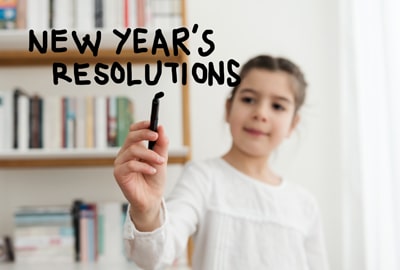Embracing Judaism’s Unique Approach to New Beginnings
December 28, 2023 | Jewish Traditions and Values, Tips and Resources

By Abigail Malischostak
Confession: Keeping a New Year’s resolution has never been my strong suit. I often get caught up in the excitement of starting a new year fresh, taking on new habits or making healthier choices.
I’ve put plans in place to hold myself accountable — and then we enter January, the coldest, darkest, longest month, and my willpower goes to nothing. Over the past few years, I simply decided not to make any resolutions at all so I can stop letting myself down.
This approach extends to my parenting philosophy; I don’t discuss New Year’s resolutions with my kids. At ages 2.5 and 4.5, they’re not equipped to plan for a month, let alone a whole year.
As 2024 approaches, I began wondering whether Judaism might offer any insights on approaching the new year differently. I did some research and found that the cadence of the Jewish calendar is ideal for people, AND toddlers, who are bad at New Year’s resolutions!
Did you know that in Judaism there are actually four New Years?
- Rosh Hashanah: the high holiday that marks the start of the Jewish calendar.
- Tu B’Shevat: known as the new year for the trees.
- The first of Nisan: marks the start of the season of the Jews’ redemption from Egypt and marks the historical new year of the reign of Jewish kings.
- The first of Elul: was a new year used to mark the start of the fiscal year referenced for tithing cattle.
In modern Judaism, most of us don’t celebrate all four of these New Years, but to me, it suggests that Judaism acknowledges the need for refreshment more than once a year
In fact, Judaism offers even more options for a refresh beyond these four New Years: Rosh Chodesh, the new month, corresponding to the cycles of the moon, and Shabbat, a weekly renewal.
What if we shifted our perspective away from a grand once-a-year new year and considered creating intentions on a more manageable scale? I know I would appreciate that, and so would my children. My ever-growing children can’t plan for a year, but we can focus on a week-to-week approach. We strive to be kinder to those around us, make healthier choices and contribute to the well-being of others.
Setting goals for learning and personal development can be shorter-term endeavors — perhaps a quarter, a month or even just a week. Then we can check in, reevaluate, learn and try something new.
Let’s leverage what Judaism teaches us to make living our crazy lives, especially with young children, easier.